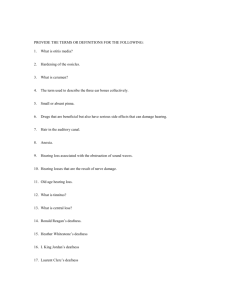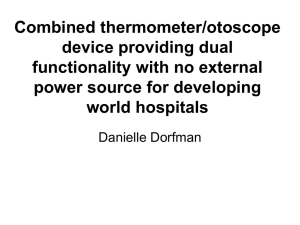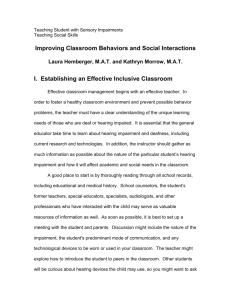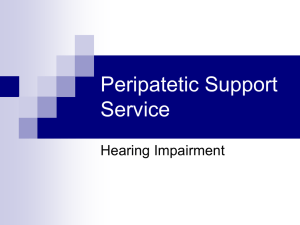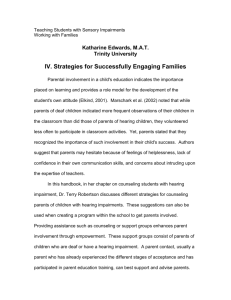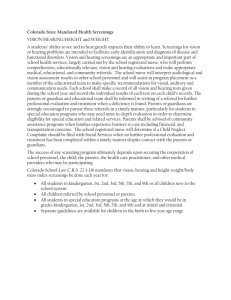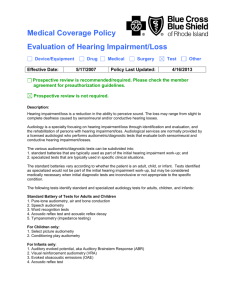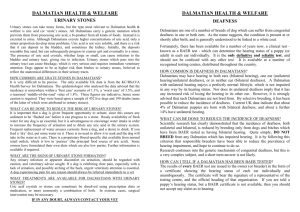Hearing Impairment, Including Deafness
advertisement
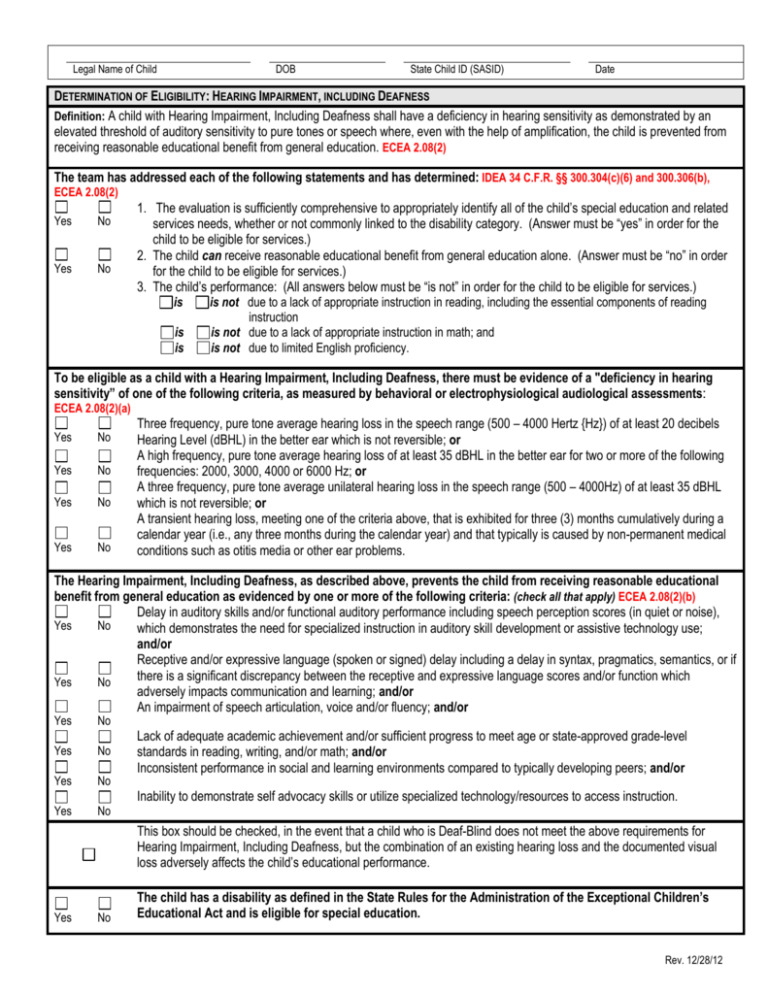
Legal Name of Child
DOB
State Child ID (SASID)
Date
DETERMINATION OF ELIGIBILITY: HEARING IMPAIRMENT, INCLUDING DEAFNESS
Definition: A child with Hearing Impairment, Including Deafness shall have a deficiency in hearing sensitivity as demonstrated by an
elevated threshold of auditory sensitivity to pure tones or speech where, even with the help of amplification, the child is prevented from
receiving reasonable educational benefit from general education. ECEA 2.08(2)
The team has addressed each of the following statements and has determined: IDEA 34 C.F.R. §§ 300.304(c)(6) and 300.306(b),
ECEA 2.08(2)
Yes
No
Yes
No
1. The evaluation is sufficiently comprehensive to appropriately identify all of the child’s special education and related
services needs, whether or not commonly linked to the disability category. (Answer must be “yes” in order for the
child to be eligible for services.)
2. The child can receive reasonable educational benefit from general education alone. (Answer must be “no” in order
for the child to be eligible for services.)
3. The child’s performance: (All answers below must be “is not” in order for the child to be eligible for services.)
is
is not due to a lack of appropriate instruction in reading, including the essential components of reading
instruction
is
is not due to a lack of appropriate instruction in math; and
is
is not due to limited English proficiency.
To be eligible as a child with a Hearing Impairment, Including Deafness, there must be evidence of a "deficiency in hearing
sensitivity” of one of the following criteria, as measured by behavioral or electrophysiological audiological assessments:
ECEA 2.08(2)(a)
Yes
No
Yes
No
Yes
No
Yes
No
Three frequency, pure tone average hearing loss in the speech range (500 – 4000 Hertz {Hz}) of at least 20 decibels
Hearing Level (dBHL) in the better ear which is not reversible; or
A high frequency, pure tone average hearing loss of at least 35 dBHL in the better ear for two or more of the following
frequencies: 2000, 3000, 4000 or 6000 Hz; or
A three frequency, pure tone average unilateral hearing loss in the speech range (500 – 4000Hz) of at least 35 dBHL
which is not reversible; or
A transient hearing loss, meeting one of the criteria above, that is exhibited for three (3) months cumulatively during a
calendar year (i.e., any three months during the calendar year) and that typically is caused by non-permanent medical
conditions such as otitis media or other ear problems.
The Hearing Impairment, Including Deafness, as described above, prevents the child from receiving reasonable educational
benefit from general education as evidenced by one or more of the following criteria: (check all that apply) ECEA 2.08(2)(b)
Delay in auditory skills and/or functional auditory performance including speech perception scores (in quiet or noise),
Yes
No
which demonstrates the need for specialized instruction in auditory skill development or assistive technology use;
and/or
Receptive and/or expressive language (spoken or signed) delay including a delay in syntax, pragmatics, semantics, or if
there is a significant discrepancy between the receptive and expressive language scores and/or function which
Yes
No
adversely impacts communication and learning; and/or
An impairment of speech articulation, voice and/or fluency; and/or
Yes
No
Yes
No
Yes
No
Yes
No
Lack of adequate academic achievement and/or sufficient progress to meet age or state-approved grade-level
standards in reading, writing, and/or math; and/or
Inconsistent performance in social and learning environments compared to typically developing peers; and/or
Inability to demonstrate self advocacy skills or utilize specialized technology/resources to access instruction.
This box should be checked, in the event that a child who is Deaf-Blind does not meet the above requirements for
Hearing Impairment, Including Deafness, but the combination of an existing hearing loss and the documented visual
loss adversely affects the child’s educational performance.
Yes
No
The child has a disability as defined in the State Rules for the Administration of the Exceptional Children’s
Educational Act and is eligible for special education.
Rev. 12/28/12
Legal Name of Child
DOB
Multidisciplinary Team Members
IDEA 34 C.F.R. § 300.306(a)(1); ECEA 4.02(6)(b)
State Child ID (SASID)
Date
Title
A copy of the evaluation report(s) and the eligibility statement has been provided to the parent(s). IDEA 34 C.F.R. § 300.306(a)(2)
Rev. 12/28/12

